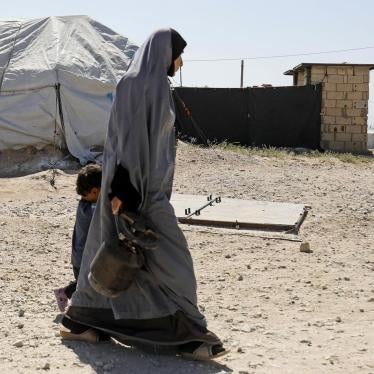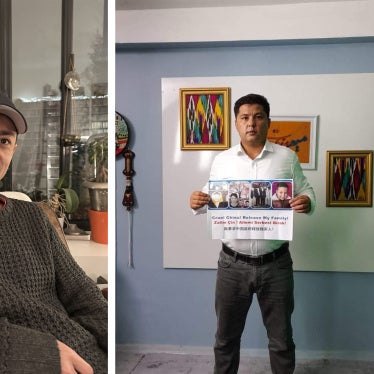Dear High Representative,
I am writing to urge you to support the urgent adoption of a European Union freeze on any assets, located within the European Union, of the Syrian National Oil Company, Syrian National Gas Company, and the Central Bank of Syria, until the Syrian government demonstrates that it has stopped committing gross human rights abuses against its own citizens. As the human rights situation in Syria continues to deteriorate, the freezing of assets in the European Union would send a powerful message to the Syrian government that its assets in the EU would not be freely available to finance repression or fund serious human rights abuses.
While we welcome the targeted sanctions already invoked by the EU against 35 Syrian officials and four entities in response to widespread, serious, and un-remedied human rights abuses by Syrian security forces, we believe the time has come for the EU to freeze the assets of these additional three key Syrian government institutions. Such sanctions would be similar to those the EU imposed against the Libyan oil sector and central bank earlier this year.
Since the beginning ofantigovernment protests in mid-March, Human Rights Watch has documented a systematic pattern of serious human rights violations committed by Syria‘s authorities. Additionally, information obtained by Human Rights Watch from other organizations suggests that security forces have shot and killed almost 2,000 civilians as of August 10, 2011, and have detained more than 10,000 activists, protesters and even bystanders, regularly subjecting them to torture and ill-treatment. Despite presidential amnesties and promises of reform, thousands of activists and protesters remain in detention with no confirmation of their whereabouts or the legal grounds for their detention. Evidence of systematic killings and torture by Syrian security forces in some of Syria’s cities, such as that committed in Daraa, strongly suggest that these acts rise to the level of crimes against humanity. Syria’s authorities have sought to hide their violations by preventing access to journalists and independent observers to protest areas, limiting, and at times completely shutting down, internet and telephone communications inside the country, and refusing to grant access to a UN-mandated human rights investigation team.
Under Syrian law, the government is the major shareholder in the oil and gas sector through its ownership of the Syrian National Gas and Syrian National Oil companies. These two companies have a 50 percent share of every oil and gas project inside the country. In its most recent Article IV country report, dated March 2010, the International Monetary Fund estimated that the Syrian government earns approximately €2.1 billion from domestic international oil and gas revenues. Most of Syria’s oil and gas is used domestically, however, approximately 96 percent of Syria’s oil exports go to Europe, primarily to Italy, the Netherlands, France, and Germany.
We recognize that sanctions affecting any government’s revenues have the potential of impacting government services to the general population. Since the government of Syria does not fully disclose how it uses these revenues, it is impossible to determine exactly what impact the reduction of such revenues will have on services benefiting the general population. However, after careful consultation with a number of Syrian human rights activists inside and outside Syria, and given the severity of the ongoing crackdown, we believe it is essential to send the message that any Syrian government funds held in the EU should not be available to the Syrian government while it commits serious human rights abuses. Such a stance is consistent with the EU’s commitment to its responsibility to protect.
Concerns about any potential humanitarian impact from the imposition of these sanctions should be addressed by regular and full reviews. Unless the humanitarian impact is shown to be disproportionate, it is our position that the asset freeze against Syrian officials and entities should remain in effect until Syria’s government demonstrates that it has undertaken specific measures, or demonstrated a change of policy, that will end its ongoing culpability for the current human rights crisis. These measures should include: a cessation in the use of excessive and lethal force against peaceful demonstrators, allowing Syrians to exercise their fundamental right to public assembly by participating in peaceful demonstrations, releasing all detainees held merely for participating in peaceful protests or for criticizing the Syrian authorities, cooperating with the UN-mandated human rights investigation team or other international mechanisms tasked with investigating alleged human rights violations, granting unhindered access to journalists and humanitarian groups to Syria, and, taking credible and transparent steps to hold those responsible for the crackdown accountable.
So far, the Syrian government has been resistant to persistent condemnation by the EU and others, targeted sanctions on key individuals, and/or any other measures. Such reluctance, combined with the escalating human rights abuses and the gravity of the situation, now requires additional measures be instituted to stop continuing abuses. Given that some of the EU’s member countries are the key purchasers and consumers of Syrian oil, an EU asset freeze will likely have much more of an impact than previous efforts. Freezing the assets of the Syrian National Oil Company, Syrian National Gas Company, and the Syrian central bank located within the European Union could be a key step to advancing pressure on the Syrian government to end its policy of systemic, grave and widespread human rights abuses and to allow international monitors into the country.
Sincerely,







